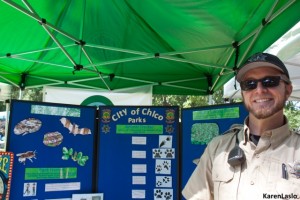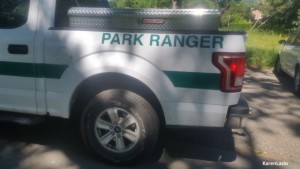by Steve Breedlove
“If you want a picture of the future, imagine a boot stomping on a human face forever” – George Orwell.
At this moment, Chico’s unelected city bureaucrats are in the process of moving Park Rangers into the Police Department, arming them and sidelining their function as naturalists and stewards of our recreational commons. Apparently, “broken windows” enforcement of minor infractions is the preferred method of addressing very real and material social problems.

Some rangers are not interested in undergoing police training.
In a public hearing (April 24 Parks Commission), the assistant city manager tried to deflect the dissent of citizens in attendance, advising us that the Council had not approved it. Curiously, he also argued it was imperative to set Police Academy dates this calendar year.
Notwithstanding the citizens’ and two of three park rangers’ discomfort with transforming caretakers into armed agents of the state, he assured us that they will be trained–although “trained” officers killed Desmond Phillips not long ago–and that being deputized won’t take the rangers away from their park duties. This move is treated as a simple shuffle of personnel, but in reality it is an existential and ethical fork in the road demanding we choose, now, how we will respond to new economic and ecological realities unfolding before us.
The proposed increase of Chico PD personnel will make our population-police ratio on par with San Antonio and Wichita, but Chico suffers from few crimes in comparison. Also noteworthy, violent crime in Chico declined precipitously from 2015 to 2016 without an increase in personnel. So why is the city’s obsession with “public safety” holding the discretionary budget hostage without empirical need?
We should all use a critical eye on the monthly arrest record and crime statistics available on the CPD’s website. (See column on right of CPD website.) While people are certainly arrested for endangering the public’s safety, the majority of arrests are misdemeanor bench warrants and nuisance crimes, like being homeless and somewhere you’re not welcome or related to substance use and abuse. To simplify a complex subject, these problems are manifestations of an economy and society that treats our poorest as unwanted, disposable, deplorable.
Chico is not a dangerous city and we don’t need to deputize our park rangers. Bourgeois prejudice against the homeless and poor is rooted in the idea that if we don’t see it, it doesn’t exist. From Haymarket Square to Ferguson to Standing Rock, the modus operandi of the moneyed class is to ignore and mischaracterize fundamental inequities and injustices, respond violently to those who successfully draw attention to them (whether or not they practice nonviolence) and punish every minor infraction to remind the populace that order will be maintained no matter how hard it is to breathe under the loafer of the oligarchy or the boot of their enforcers.
We have to ask ourselves: what are the trade-offs of a police force that consumes almost half of the General Fund (fully twice the fire department budget, and not coincidentally, somewhat proportional to U.S. “defense” spending)? More nuisance punishment means less money to maintain our public spaces and urban forest as habitats of democracy, to cultivate cooperative housing and urban farms, and to incubate worker-owned enterprises as engines of innovation.
From the Okies who didn’t have that Do Ra Mi to single mothers of color in Oakland, we have long excluded from society those who are failing to succeed in an economic system that consumes biomes and livelihoods and vomits waste. “Public safety” as used by those in power is Orwellian doublespeak for the disposing of people inevitable in a predatory economic system. Safety can only be guaranteed in a vibrant, harmonious civic body nurtured through securing the bottom courses of Maslow’s pyramid for everyone. Our public safety priority should be a social worker, food, housing and healthcare for all those in need.

We are in a transformative moment in history and every decision we make now guides us through an uncertain future. It is critical that the City Council retains authority on questions defining the character and ethical priorities of our city. Cities belong to the people, not unelected bureaucrats. The council should agendize a full public hearing on the issues of broken-windows policing against the homeless and arming our park rangers. Instead of making excuses as to why monumental problems can’t be solved, the Council should place a resolution on the ballot asking if we should continue the status quo. A resounding “no” vote would give the city the mandate and power as chartered under the California Constitution to begin building a secure future where no one is disposable.
Steve Breedlove is a father, gardener, veteran and critical optimist. He wrote this guest commentary for ChicoSol and believes “an abundant, ethical, ecological society can be cultivated in perennial polycultures using appropriate tech and organized into bioregional confederal democracies.”

What was interesting about Mr. Constantine’s statements was that making Park Rangers police officers is “not a policy decision” it is “an operational decision” that the City Manager can make without involving either the City Council or the Park Commission. It is a “policy decision” that first needs to be made by the Park Commission since they are chartered to manage the parks, greenways, and creekways in the City. The Park Commission Chairperson said that they were not told by the City Council to discuss the issue; therefore they shouldn’t discuss it. WTH? That is their job – policy decisions without direction by the Council!
So many issues here! I agree with you about the decisions being made by staff – where have you been? Constantin has been our erstwhile mayor for some time now, and this isn’t the worst decision he’s made or the worst policy he’s had rubberstamped by council.
I agree that using park rangers as cops is misdirected, but I don’t like the way you romanticize the bums. Many of these people are criminals, committing criminal acts, using Bidwell Park as a toilet and an escape route. For the better part of a year my husband and I have reported cars broken into, illegal camps, trash piles that included human poop in dog poop bags, syringes, bike parts and other obviously stolen items, discarded. We see transients riding through our neighborhood on children’s bicycles.
Maybe you haven’t been approached by a hostile transient in the park – I have, and my husband has encountered them when walking our dog. They try to frighten us away from their camp sites –
which sit right along established trails. Yesterday a man with a knife tried to attack a Station 5 employee. How much of this crap are we just supposed to take?
how on earth do you know it was human poop in that dog bag? what do you do? go up to these homeless and their camps and start looming g through their stuff? did you look into the poop bag to investigate if it was dog poop or human? I think your way to hatefilled and hostile about the homeless and public employees.